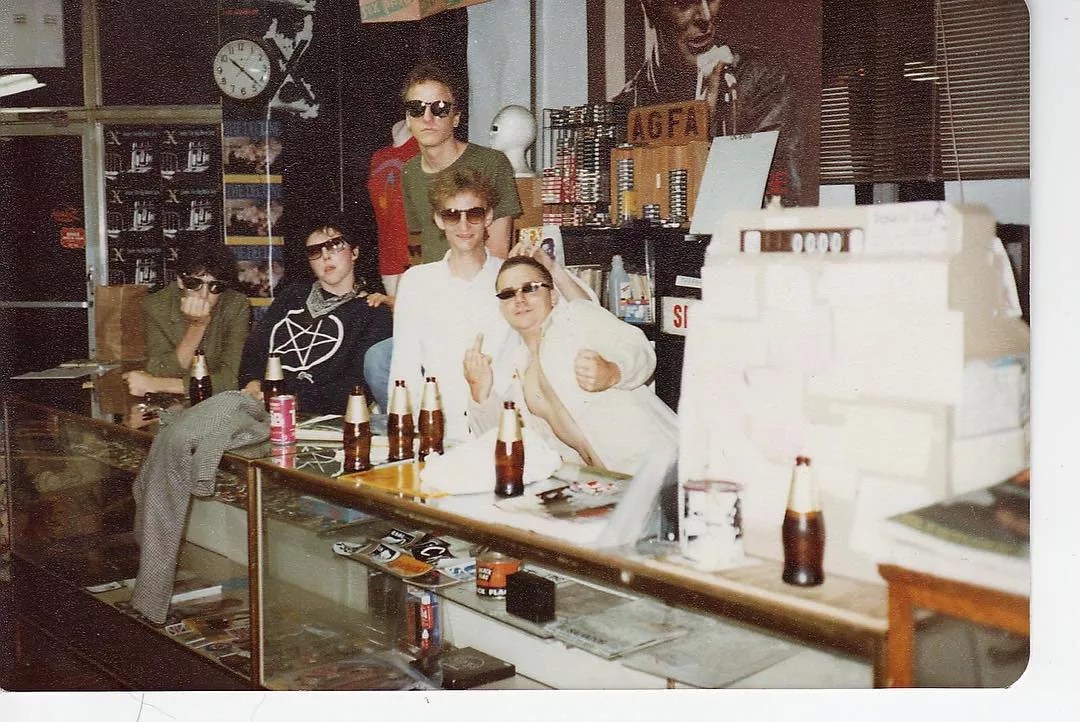
Courtesy of Duane Davis/Wax Trax

Audio By Carbonatix
The story of Wax Trax began in 1975 in an Ogden Street storefront just off Colfax, where partners Jim Nash and Dannie Flesher sought to introduce Denver listeners to rare English punk and glam exports, rockabilly, R&B and garage rock. But as Duane Davis – co-owner of the store with Dave Stidman since they bought it from Nash and Flesher forty years ago – says, Denver wasn’t quite big enough for their esoteric quest.
“Those guys knew their stuff,” Davis recalls. “They saw there was a limit to the kind of audience and music that they were moving toward, and they wanted to get out to Chicago, where they could find a bigger population of people who were into the things they liked.”
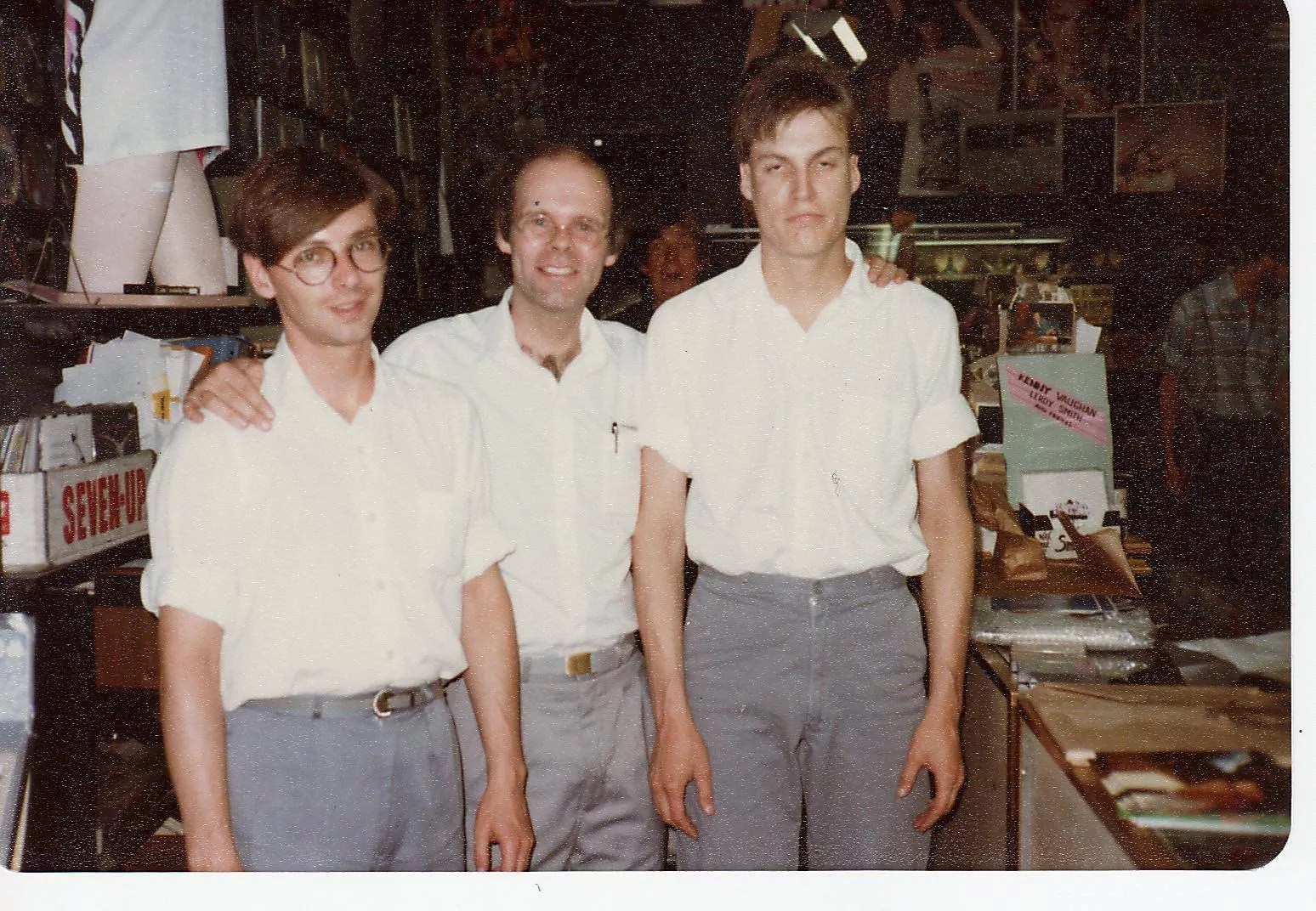
Duane Davis with early employees Erik Erikson (left) and Steve Knutson (right), “not exactly thin white dukes, but trying.”
Courtesy of Duane Davis/Wax Trax
Nash and Flesher shaped a more perfect destiny, plus their own record label, once they got to Chicago, but they left behind a certain ambience. The tale of how Davis and Stidman, two Jefferson County Social Services caseworkers, came to run Wax Trax for four decades is an odyssey in itself.
“We were at the annual Jeffco juvenile crisis unit’s beer-and-chili celebration, staggering around in the sunshine, and Dave said to me, ‘Let’s get a record store,’ Davis remembers. “I said, ‘Sure,’ and in November, we had a store. Dave knew Jim and Danny and was already involved in going to the Goodwill, buying used records and selling and trading them at Wax Trax.” By this time, he adds, the store had moved to its present location at 13th Avenue and Washington Street.
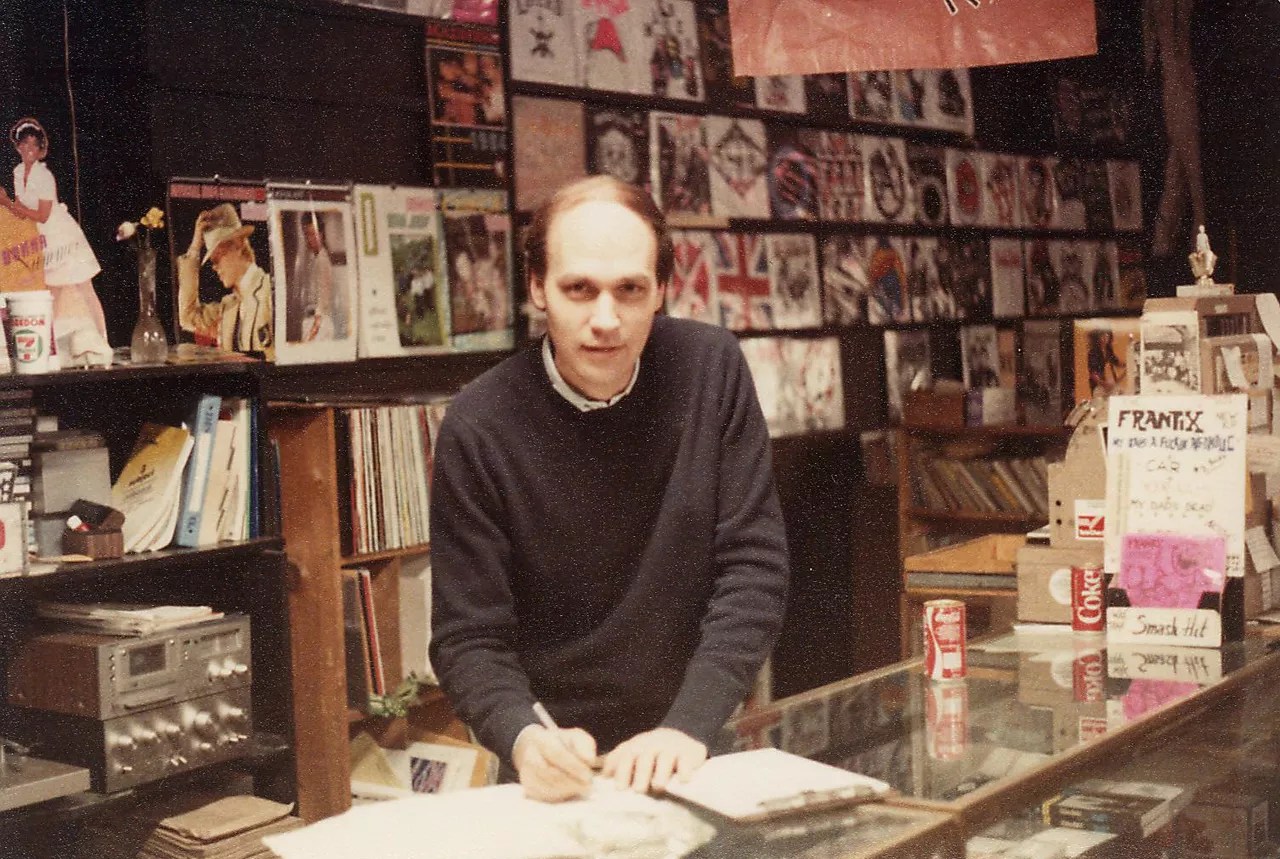
Dave Stidman has spent decades of his life behind the counter at Wax Trax.
Courtesy of Duane Davis/Wax Trax
“We looked at a couple of other stores, too, but we liked the setup up where Jim and Dannie were, and it was available for a relatively good price,” Davis continues. “Dave was desperate to get out of social services; I was more ambivalent. I had been promoted to supervisor, so I continued on while Dave moved into the back of the store, where Jim and Dannie had an apartment. It was pretty primitive. In the winter, there was only one ceiling-hung heater in the store, and that barely pushed heat into the back, but he had a shower, kitchen, stove and fridge. That’s all been torn out long ago. Dave lived back there for a year or more.”
So began their learning curve. “It actually went surprisingly easy for two guys with no retail experience at all,” Davis remembers. “We used to style ourselves as Dada businessmen – totally free-form. One key to the fact that we’re still standing forty years later is that Dave and I loved rock and roll but we weren’t hooked into the clichéd rock-and-roll lifestyle. We took the money as it came in and plowed it back into the store, particularly into expanding our inventory.
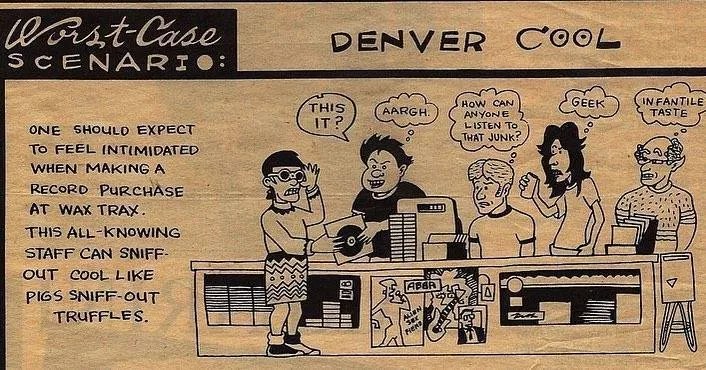
The staff at Wax Trax has always been known for having an attitude.
Kenny Be, Westword
“We were adventurous and eclectic in our tastes. Jim and Dannie laid down a framework for Wax Trax as a place where you could find the newest, most experimental music,” says Davis. “There was a push for indie music out of England, so we built up connections with distributors and importers and educated ourselves about English punk and post-punk music. We were bringing it into the store at an alarming rate, putting ourselves on the edge and managing to go forward.”
Early on, the Davis/Stidman Wax Trax distinguished itself as the center of the universe for a new kind of fan, obsessed with whatever was new and fashion-forward, and the people they hired fit the niche and met that public with a famous attitude.
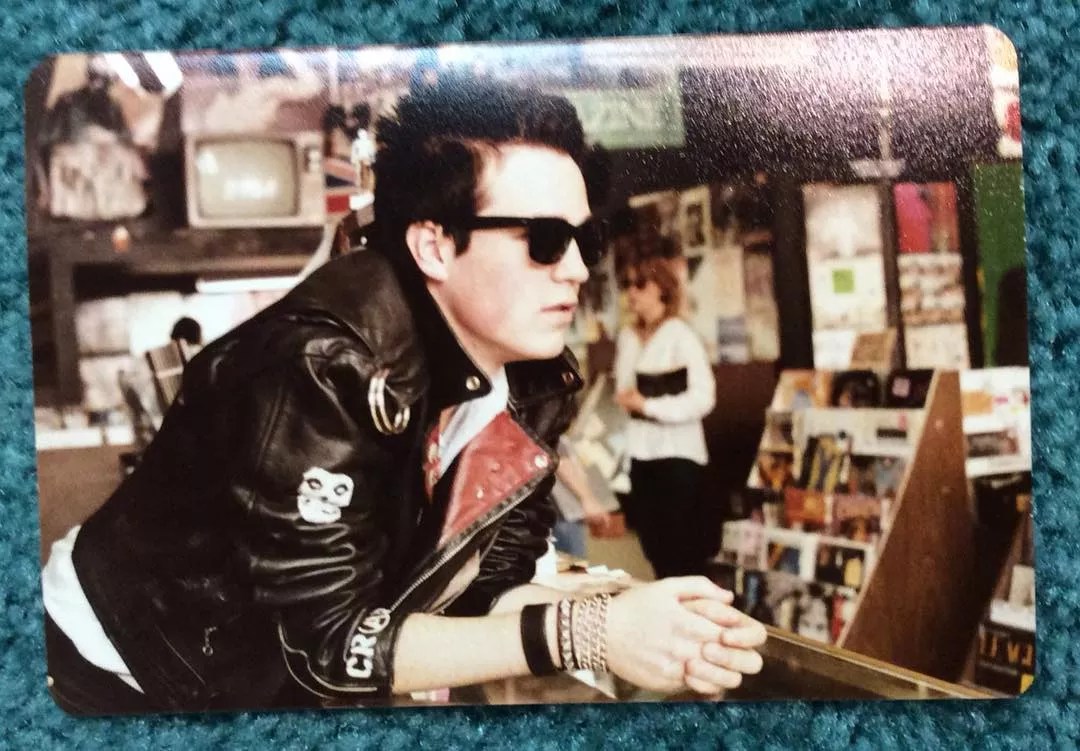
Geoff Paxton at the counter in the early
Courtesy of Duane Davis/Wax Trax
“We started hiring kids who hung out in the store all the time and would never leave,” Davis recalls. “It was just easier to put them behind the counter.”
Wax Trax began to draw customers with more expansive tastes. “It happened a little on its own, based on the idea that we believed music should be an adventure and not just Top 40,” Davis says. “We kept two racks by the counter: one with the top twenty – for folks who worked downtown and wanted to pick up the latest Bonnie Raitt on their way home from work – and the other with independent releases nobody’s ever heard of that we would talk up.
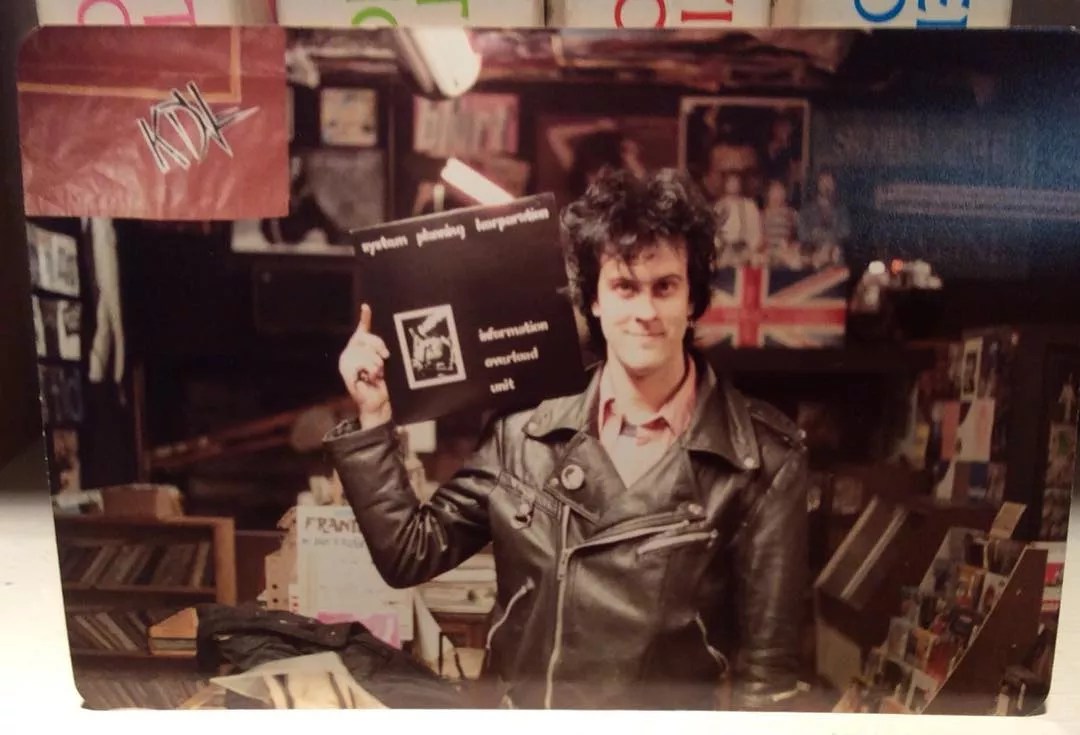
Dave Wilkins, a Wax Trax stalwart through the years.
Courtesy of Duane Davis/Wax Trax
“In the early ’80s, one great thing was standing at the counter looking at the people in the store, and there’d be a kid in a denim jacket buying a U2 album next to a kid dressed in leather and safety pins with a two-foot mohawk, and another kid wearing all black who was into Bauhaus. And next to him or her were a couple of little old ladies with blue-tinted hair and bowling shoes who’d heard we had all the Elvis you could ever find, including the bootlegs and quasi-legal-status stuff. It was a cultural circus that we loved.”
And Wax Trax wasn’t simply a record store. Early on, Davis and Stidman threw some short-lived punk parties with the Jonny 3, the Defex, the Young Weasels and other Colorado punk bands of the day, and later stocked their shelves in symbiosis with the old Mercury Cafe on Pearl Street, where Marilyn Megenity was booking bands like X, Black Flag and the Dead Kennedys. The shop continues to host in-store concerts with local and not-so-local bands.
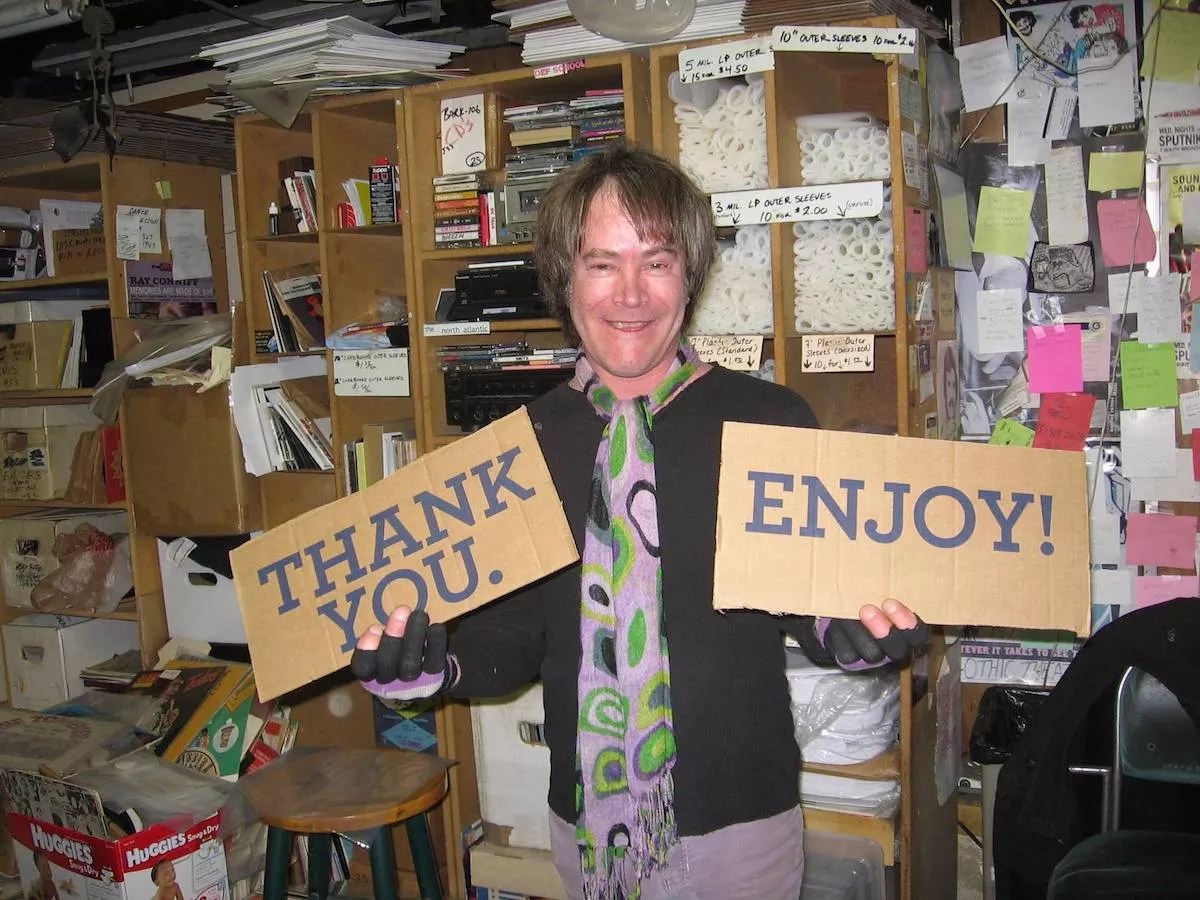
Wax Trax vinyl store’s Sam Schiel demonstrates his customer-service skills.
Courtesy of Duane Davis/Wax Trax
Wax Trax also carried recordings by Denver bands, a practice that continues to this day. “The section is not as important as it was before the Internet,” Davis says. “Kids don’t need to have a store, but they bring them in so they can say, ‘I’ve got my CD at some stores,’ and they can put that on a mailer to the clubs and maybe get a spot on the marquee.”
The store experimented with launching a record label, Local Anesthetic (best remembered for cutting the Allen Ginsberg track “Birdbrain,” backed by Denver’s own Gluons, whose song “Sue Your Parents” graced the B-side), and opening and closing shops in Boulder and along 13th Avenue in Denver.
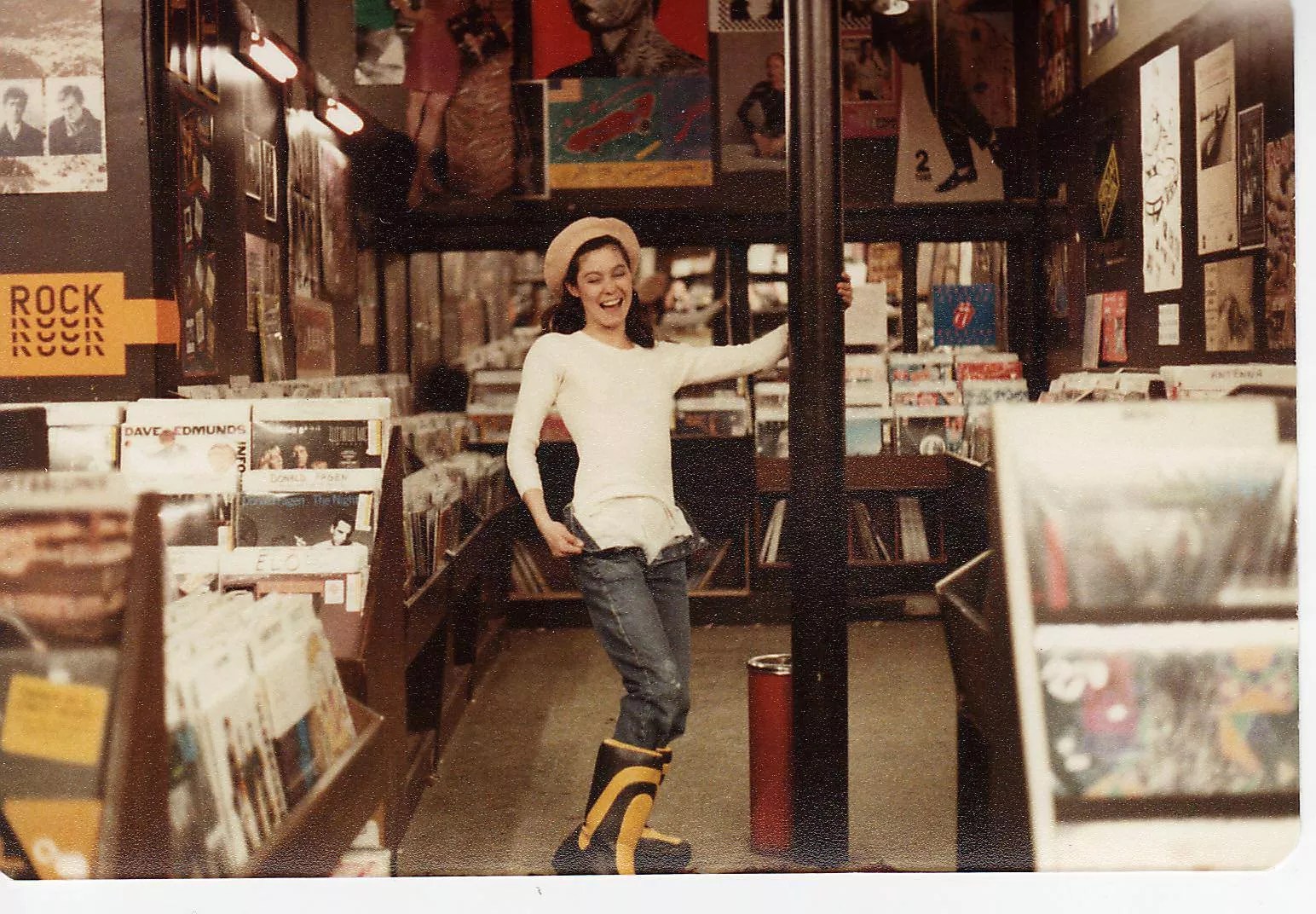
Employee Sherry Gray, clowning around.
Courtesy of Duane Davis/Wax Trax
The music industry’s evolution in the ’80s from vinyl to CDs brought new vitality and, eventually, challenges to Wax Trax. “The explosion of buzz over CDs was a blessing and a curse,” Davis allows. People, he adds, were re-buying their entire vinyl and cassette collections in the new format, and once that became clear, Wax Trax began feeding the replacement frenzy, possibly not to the store’s advantage. By the 2000s, with the rise of Napster, CDs crashed hard, and so did Wax Trax.
“CDs became the new eight-tracks,” Davis continues. “They were falling in sales month by month. It was demoralizing, to say the least. The Internet was in the process of killing recorded music and retail businesses across the country. Every week, we’d hear about this chain or that indie store closing.
“We reached our lowest ebb in 2003,” Davis notes. “We were getting together to discuss what we would do if we had to close our doors. It didn’t feel good at all. But Dave and I were always very slow to make decisions. That played against us when CDs came around, but it helped us later on. We considered what would happen if we sold the building, and we putzed around, making and losing money.”
On the upside, vinyl was making a slow comeback. “We never stopped having a vinyl store,” Davis says with pride. “So many bailed out of it, but they never stopped making it, especially in the ’90s, with the whole techno and dance craze. There were more twelve-inch singles made, and we were getting them in by the truckload.” By turning in its tracks and regrouping, Wax Trax managed to stay alive by re-embracing the platters. Vinyl was an essential game-changer, despite downturns in the market and competition from other stores. “Without the vinyl resurgence, I personally don’t think we’d still be in business,” he says.
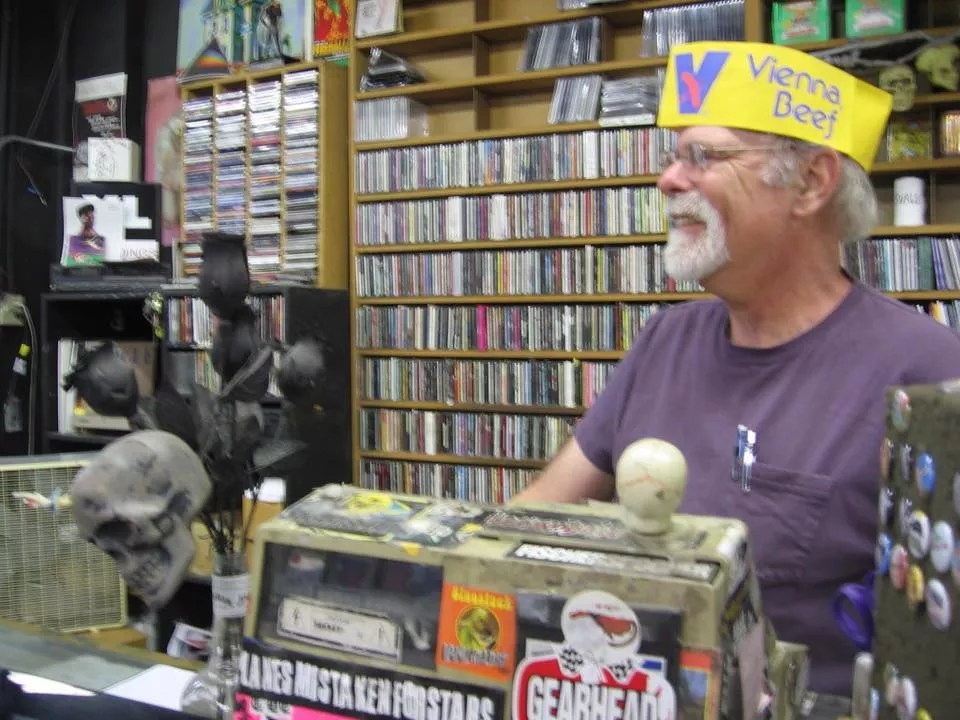
Duane Davis considers diversifying at Wax Trax.
Courtesy of Duane Davis/Wax Trax
Forty years down the pipe, Wax Trax is still alive. Davis can’t quite explain it: “I would like to say it’s partly that Dave and I are so good at what we do, and partly us having the good sense and fortune to have consistently hired good people to work at the store for forty years.
“We also had the sense and good fortune to buy our building in the mid-’80s,” he reflects. “When the bad times started in 1996 from Napster, combined with big-box store price wars, it gave us some protection. We could say the rent this year is zero, and we just had to get enough together by the end of the year to pay property taxes. You hang on by your teeth.”
Will Wax Trax be around forty years from now? Davis claims no crystal ball: “Dave and I are getting to be old guys. The conversation comes up more than it used to: How do we move into a future where we might not be involved in the store?
“For the time being, I’ll answer that with a joke,” he adds. “Dave wants to die standing at the counter cleaning a seven-inch single put out for a quarter. I can’t imagine anything other than that scenario occurring.”
Wax Trax Fortieth-Anniversary Party
7 p.m. Saturday, November 17, Mercury Cafe, 2199 California Street, free.